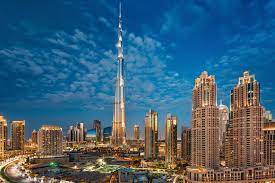Rich Indians’ preferred destination is Dubai’s Beverly Hills. This Is Why
Adel Sajan’s family constructed luxury buildings in Dubai, and now his company is seeing one of the largest booms it has ever had, as a wave of affluent Indians are buying $250,000 flats.

The family owns a 26,000-square-foot estate in Emirates Hills, a gated community that is often referred to as Dubai’s Beverly Hills. The 34-year-old managing director of Danube Group stated in an interview at his mansion, “I think every second house over here is an Indian house,” where the glass-walled garage displays more than 15 cars, including Bentleys, Range Rovers, and Lamborghinis, and the marble-floored living room is the size of a miniature soccer field.
Although the Sajans are not new to the scene, their increasing riches and commercial ventures are now significantly supported by the inflow of funds from the subcontinent. Three decades after Adel’s father began Danube in the United Arab Emirates, Indians account for 32% of the company’s clients in the UAE, and they are helping to drive some of the company’s greatest advances.
China’s wealthy have dominated global money flows for years, but Dubai is now providing one of the first indications of the possible influence India’s new billionaires and wealthy families may have abroad. According to UBS estimates, India had a 4.6% increase in total family wealth last year, despite reductions in North America and China. This is one of the biggest financial swings in history. The UAE is the largest offshore benefactor of the South Asian nation’s rise on the financial charts because of its simple immigration regulations, cheap taxes, and close proximity.
According to immigration agency Henley & Partners, the Middle Eastern nation would be the most popular destination for high-net-worth Indian immigrants in 2023. According to persons familiar with the situation, billionaire Mukesh Ambani purchased beachfront property on the emirate’s opulent Palm Jumeirah island last year, as reported by Bloomberg at the time. The actor Vivek Oberoi has a house and a real estate company in the area, and he posts images of his Rolls Royce in Dubai on Instagram.
Bollywood stars and athletes in India frequently have throngs of fans waiting outside their houses in the middle of the night to catch a glimpse of them, according to Atul Muchhala, executive director of India operations at IQ-EQ, a company that serves Indian family offices across multiple nations, including Dubai. “If they have real estate properties in Dubai or one of the islands there, they get privacy, while still being able to hop on a short flight back to Mumbai.”
The influx of funds from affluent people coincides with the Middle Eastern government’s efforts to forge new international alliances in lieu of its long-standing alliance with the United States.
Declining stock and real estate prices have hurt wealthy Chinese investors who had been making investments from Vancouver to Sydney. However, Henley projects that over the next ten years or so, India will see an 80% increase in “centi-millionaires”—those with assets exceeding $100 million—making it the country with the second-highest growth rate in the world, after Vietnam. The US is predicted to rank second among wealthy Indian travel destinations, behind Dubai, and ahead of Australia, Canada, and Singapore.
Nevertheless, capital constraints and a customary reluctance to withdraw money too far from home mean that the majority of India’s new billionaires are anticipated to remain domestic. Furthermore, it can become more difficult for those who are rushing to Dubai or other places to withdraw their money.
India already has restrictions on the amount of money its rich citizens may transfer abroad; the annual cap is $250,000. However, as of October, such transactions are subject to a 20% tax, unless the money is utilized for medical or educational costs.
According to those acquainted with the situation, Indian tax authorities are also becoming more worried that some of the money leaving India may be ending up in Dubai due to the latter’s more lenient regulations. Although there is a system in place for India and the UAE to exchange information on alleged unaccounted money, an individual with knowledge of the situation stated that India is finding it more and more difficult to get information from the Middle Eastern nation. There has been very little information flow, the source added, despite the fact that it has been relentless in its requests for data of high net worth people and Indian firms operating out of the UAE.
An email for feedback from a tax department official in India was not answered. In a statement, a representative for the UAE government claimed that the Middle Eastern government adheres to international agreements concerning tax cooperation, completely complies with international norms, and maintains tight ties with its bilateral allies. According to the statement, “the UAE and India have long-established strong and robust strategic relations.”
Under the UAE Golden Visa scheme, foreign nationals who make significant investments are also eligible to remain for ten years.
Additionally, wealthy Indians choose Dubai because it provides a platform from which they can easily access their riches across the world and diversify their investment portfolio, according to Daksha Baxi, an international tax specialist and the founder of the Mumbai-based consulting business SRI Solutions. “Good infrastructure and the fact that Dubai offers a luxurious lifestyle is another reason for HNIs going there,” she said.
Rich Indian money flows are supporting Dubai’s luxury real estate market because they coincide with a slowdown in rich Russian money flows, which had increased after the Russian government’s deployment of soldiers into Ukraine. Henley predicts that this year, more billionaires will arrive in the Middle Eastern nation from India than from any other country.
Indians continue to be the top purchasers of real estate in the city, according to Dubai brokerage Betterhomes, despite the fact that Russians who have been negatively impacted by the weakened ruble have fallen out of the top three buyer rankings.
The Indian Ministry of External Affairs estimates that there are now 3.5 million Indians residing in the United Arab Emirates. Many people consider Dubai to be home because of their longstanding cultural links to India.
Three years ago, Indian star Vivek Oberoi made Dubai his second home and opened the Bricks n Woods real estate company in the center of the city. The company employs over 300 professionals who deal with both individuals and family offices. In addition to investing in start-ups worldwide, Mr. Oberoi operates the lab-grown diamond company Solitario out of Dubai. Dubai appeals to his family because of its worldwide sports, social life, and comfortable time zone, he added.
“Indians have made a significant contribution to the construction of Dubai as it exists now. Hindi is almost a second language here, and we are treated with such respect,” Oberoi said.
educated at Harvard Vishal Goel is a serial entrepreneur who moved to Dubai to avoid lockdowns and COVID measures in India. He has interests in healthcare and K–12 education.
JV Ventures, a venture capital and private equity investment firm, is led by Goel. “My wife established her company in the DIFC fintech hub and I could take my fund management business beyond India,” Goel said.
With the help of Indian money, Sajan’s Danube firm raised its sales targets to $2.5 billion this year from $1.5 billion the previous year. Adel’s father, Rizwan Sajan, who founded Danube, received Emirati citizenship three years ago. Adel is now working on obtaining his.
“I am a proud Indian,” Adel said. “Having said that, the way Dubai has spoiled us, especially me, somebody who’s been here all my life, to imagine myself to live in India is very challenging,”







